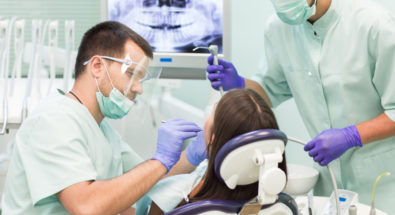What Is Oral Maxillofacial Surgery
You may have heard the term dental surgeon. Or perhaps the term oral surgeon. Maybe you have been told by your dentist that you need oral surgery. But what is oral surgery and what is an oral surgeon? The proper name for an oral surgery specialist is actually an Oral and Maxillofacial Surgeon (OMS). But many people do not know exactly what an OMS does and the broad scope of procedures included in the field of oral and maxillofacial surgery. Like everyone else you go on the internet to do research and might come across these dental terms and it might be very confusing. We hope to give you a better understanding with this article as well as introduce why an OMS plays such a vital role during the COVID-19 pandemic so far.
Oral & Maxillofacial Surgery Specialty
Oral and maxillofacial surgeons (OMS) is a specialty within dentistry, but it is also viewed as a surgical specialty encompassing both dentistry and medicine together.
Oral surgery, such as an extraction of a tooth or dental implant procedure, is surgery that is performed in the oral cavity (mouth). But not everyone who performs “oral surgery” is an oral surgeon. There is a significant difference between having an oral surgery procedure and seeing an oral and maxillofacial surgeon (OMS). As such, oral surgery is basically a category of procedures. While an oral and maxillofacial surgeon is a surgeon who is an expert in performing facial, oral, and jaw surgery.
So what is the difference between a general dentist and an OMS? Many patients are very familiar with the medical distinction between a family doctor (general practitioner) and a specialist. There is a similar distinction among oral health practitioners.
A dentist is a general practitioner of oral health and can diagnose and treat common dental diseases.
An oral and maxillofacial surgeon specializes in oral surgery, removing impacted wisdom teeth, difficult teeth extractions, placing dental implants, bone grafting, and much more.
Education and Training
Although both are oral healthcare providers, and similar to other dental specialties, to become an OMS requires further education beyond completion of dental school. After earning a Doctor of Dental Surgery (DDS) or Doctor of Dental Medicine (DMD), your OMS needs to complete a further four-to-six years of a hospital based surgical residency program. Many OMS, during this training, may also receive a medical degree licensure during this residency training, depending on their scope of practice in the hospital or additional fellowship training. In Canada, the OMS also needs to take a National Board Examination to be recognized as a Certified Specialist in Oral & Maxillofacial Surgery.
As you can see, because of their hospital-based residency training, OMS occupy a unique role between dentistry and medicine. The goal of OMS training and education in this dental specialty is to prepare them to serve as a bridge between dentistry and medicine. During their residency, they have to undergo additional training and rotation in multitude of areas, including anesthesia, general surgery, internal medicine, plastic surgery, and otolaryngology.
OMS specialty is also very unique in that they have additional training and certification in all levels of anesthesia and sedation, from local to general anesthesia, as well as intravenous sedation. This is why many OMS can provide sedation during your wisdom teeth surgery at the office.
Scope of Oral and Maxillofacial Surgery
So what else do OMS provide? Their training focuses exclusively on the hard (i.e. bone) and soft (i.e. skin muscle) tissue of the face and oral cavity. Therefore they are considered the surgical specialists of the dental profession. So you can imagine their broad scope of practice is mainly concerned with surgical treatments.
Most of the common ones done in outpatient office-setting you may have heard of include:
- Impacted wisdom teeth management and extractions
- Dental implant surgery
- bone grafting or soft tissue grafting
- Tooth extractions
- Medically-compromised patients requiring dentoalveolar surgery
- Anesthesia administration during surgery
- Management of dental surgery complications
- Exposure and bond for orthodontics
- Lip and tongue-tie surgeries
- Dentoalveolar trauma management
OMS also occupy an important role in your hospitals, so many of their complicated procedures require the operating room theatre. These include:
- Corrective jaw surgery or orthognathic surgery
- Facial and trauma surgery
- Dental/facial infections
- Head and neck pathology
- Facial cosmetic surgery
- Cleft lip/palate and craniofacial surgery
During COVID-19
As you can see, based on the above scope, OMS will play an important role during this pandemic. As we have witnessed in the last few weeks, the global spread of Covid-19 is impacting us in all aspects of our lives and communities. As established by our College and the Provincial Health Authorities, all dental offices were mandated to limit their operations to urgent and emergency cases only.
These include:
- Uncontrolled dental infection or infection compromising the airway
- Trauma affecting the facial bones or dentition
- Bleeding or uncontrolled hemorrhage
- Dental extractions required prior to critical medical procedures
Based on these guidelines, you can see how most will end up requiring an OMS to manage these problems. Because of the OMS responsibility to the community and the local hospitals, they have remained open during the pandemic restriction forcing dental offices to close. In fact, our office was still seeing emergency patients because we were listed as an Emergency Clinic with enhanced Personal Protective Equipment. This is very important because by treating these emergency patients, OMS can help decrease the burden of dental emergencies on our hospitals and allow resources to be diverted to fight the Covid-19 pandemic. If a patient does require to be seen at the hospital, they will contact the OMS on call for further management.
We hope this has been informative for this interesting specialty! For more information, please contact Pacific Coast Oral and Maxillofacial Solutions!

